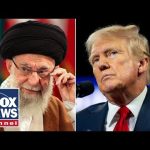Amid escalating global tensions and economic uncertainty, Ambassador Matt Whitaker, now serving as U.S. Ambassador to NATO, has offered a candid assessment of President Trump’s aggressive trade agenda. In recent remarks, Whitaker highlighted the massive trade deficits the United States faces—approximately $300 billion with China and $250 billion with Europe—and made clear that Trump’s administration is determined to rebalance the scales. For too long, America has played the role of economic patsy, buying goods from China and Europe while facing barriers to selling our products abroad. Trump’s “America First” approach is finally putting an end to this lopsided arrangement, demanding that foreign nations open their markets to American farmers and manufacturers or face stiff tariffs.
The Trump administration’s willingness to wield tariffs as leverage is already yielding results. Countries that once took advantage of America’s open markets are now lining up to negotiate. Italy’s Prime Minister Giorgia Meloni recently traveled to Washington, becoming the first European leader to do so since Trump imposed, and then temporarily suspended, a 20% tariff on EU imports. Meloni’s visit signals that Europe is taking Trump’s demands seriously, with even the European Union acknowledging the need to address the trade imbalance and reduce restrictive taxes on American goods. Trump’s firm stance is a refreshing change from the weak-kneed diplomacy of the past, and it’s about time our leaders put American workers and businesses first.
Of course, Trump’s critics—many of whom are entrenched in the globalist status quo—warn of higher consumer prices and economic disruption. But these are the same voices that have presided over decades of manufacturing decline and job losses in America’s heartland. The reality is that tariffs are a tool, not a panacea, and when used strategically, they force our trading partners to the table. Trump’s policies are already prompting European nations to reconsider their defense spending and economic priorities, with several NATO allies now committing to boost their defense budgets. This is a win not just for American industry, but for national security as well.
Ambassador Whitaker also emphasized the importance of fair burden-sharing within NATO. Years of American taxpayers footing the bill for Europe’s defense are coming to an end. Trump’s message is clear: if our allies want the benefits of American protection, they need to invest in their security. The recent commitments by four NATO allies to spend 5% of their GDP on defense, and by another ten to increase their contributions, show that Trump’s tough talk is producing real results. It’s a welcome shift from the days when America carried the load while others reaped the rewards.
As trade negotiations continue, the Trump administration’s unapologetic advocacy for American interests is setting a new standard. For too long, global elites have prioritized international institutions and foreign economies over the prosperity and security of the United States. Trump’s approach—backed by strong voices like Ambassador Whitaker’s—signals that those days are over. If China and Europe want access to the world’s largest consumer market, they’ll have to play by America’s rules. That’s not just good policy—it’s common sense, and it’s exactly what the American people voted for.




